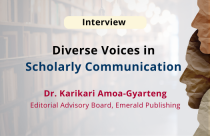Gender Disparity in Authorship Existent in Academia

In academic journals, there have been several ethical issues with respect to authorship. This is notably the case with articles having multiple authors. For example, a study done by the International Journal of Nanomedicine showed that 33% of authors admitted including scholars in their study who did not deserve authorship credit.
Inequality seen in female authorship is another issue affecting academia. This is connected to underrepresentation of women in the scientific and academic communities. This gender disparity in authorship can have negative consequences, including a lack of recognition for the work done by female scientists. In fact, it might have led to the decrease in female students entering the scientific community.
Gender Inequality in the Academic Community
Notable women are now heads of organizations that include the National Institutes of Health (NIH) and the American Association for the Advancement of Science (AAAS). However, despite these signs of progress, gender disparity still exists. In fact, a report done by the Royal Society of Edinburgh, shows that no real progress was made since 2012. Computer-related studies highlighted similar example. The percentage of women studying this subject has fallen from 32 percent in 2012 to 18 percent in 2018. This is despite the fact that women are performing at a higher level than men in these subjects.
Several studies on gender inequality have revealed that disparities exist in gender contributions in scientific publications. A study has also been done regarding gender disparity in peer review. These studies have also shown significantly higher publication rates for males in the sciences compared to women in the same field. So, this gender inequality has spread all across the academic community, beyond authorship and publishing.
What the Studies on Gender Inequality Reveal
The studies present an in-depth look at authorship and gender inequality. The studies analyze gender representation for articles with two or more authors and revealed three important points:
- Significantly, the most common gender combination are male-male author combinations or combinations where only males are included.
- Male authors disproportionately listed in the first author position. The study shows that 56.38% of published articles have the male author listed first and 43.62% had the female author listed first.
- Inequality in credit sharing might be a contributing factor to gender disparities in recognition, funding, career advancement, and academic positions.
The results suggest a need for more clarity and transparency in stating authorship when more than one author shares equal credit.
Overcoming Gender Disparity
Has academia made any progress? That is debatable. The move towards gender equality has been slow or has even stalled. Fortunately, however, the increasing number of studies done on this topic have resulted in an increase in awareness and proposed solutions.
Here are some important measures:
- University officials can focus on recruiting women in the sciences, creating mentoring programs for career advancement, and simultaneously promoting research done by women.
- Female scholars can form academic groups for women studying in the sciences. Examples include the Women in Science at Yale and the Boston University Women in Economics.
- Academic journals can increase monitoring of ethical and gender issues in authorship.
- Campuses can increase awareness and promotion of campaigns like the Women in Science and Engineering campaign (WISE). WISE promotes gender equality in the STEM fields.
What are your experiences with gender disparity in academia? If you have faced these issues, how have you overcome them? How has your university supported gender equality? Please share your thoughts with us in the comments section below.










